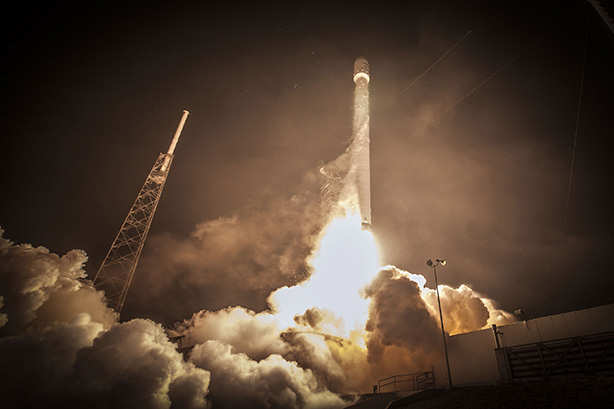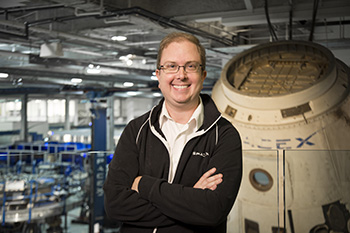PEOPLE

A SpaceX rocket launch.
Engineer Bill Riley on team experience, race cars and rockets
Bill Riley '99 designs, builds and tests space-worthy vehicles at SpaceX – a company founded by business magnate Elon Musk – working to enable people to live on other planets. As a senior director of structures engineering, Riley is taking the principles of efficient and elegant design he learned as a leader of Cornell's Formula SAE racing team beyond Earth's atmosphere into the future.
Ezra: What's hot right now at SpaceX?

Bill Riley '99, senior director of structures engineering for SpaceX. See larger image
Bill Riley: We're working hard to land and recover the first stage of our Falcon 9 launch vehicle. It's designed to be reusable, and I think will be a real game changer for the industry. We're also upgrading our Dragon spacecraft to soon carry people to the International Space Station and we have started work on our Raptor rocket engine that is designed to power future Mars vehicles.
Ezra: How were you involved in Cornell Racing teams?
Riley: I joined the team as a sophomore for the 1997 competition year. I worked on suspension, shifter and drivetrain. I was fortunate to have two great advisers, Al George and Brad Anton. The next year I took the role of drivetrain team lead and had my first exposure to design judging. For my senior year I had the position of chassis team leader.
Those skills ended up being really useful, and I used them to land a spot on the Jaguar F1 team when I worked at Ford after school. So I have had a terrific payback on my FSAE years and Cornell and consider it very core to my professional development.
Ezra: How did automotive experience with Cornell Racing translate to space exploration?
Riley: The experience was not just valuable in the mechanics of how to design, analyze, build and test a race car, but also in lightweight, efficient and elegant design; structural optimization; and project management and team interactions. Race cars and rockets are not that dissimilar, and after years of working at Ford and GM, the SpaceX offer came up and I couldn't say no any longer. I fell in love with the ideas, culture and experience of working with super smart people and helping humanity become a multiplanetary civilization. It also has a certain FSAE feel and harkens back to my days on the team.

Curvature of the Earth and sun as seen from low Earth orbit. See larger image
Ezra: I understand you hire Cornell engineers at SpaceX specifically for their team experience. What do former team members bring to the job?
Riley: Elon [Musk] has actually talked about Formula SAE in the press and on Twitter, mentioning how it's a great way to get into SpaceX. First, the project and team experience has a great level of complexity. It takes good organizational skills and highly motivated students to pull it off, but is not so lofty it's impossible. The people who excel and are competitive must have a real love of engineering and winning. Those who do are a great fit for SpaceX. Our culture thrives on self-motivation and great engineers.
Ezra: Are you still engaged with Cornell Racing?
Riley: The whole FSAE experience, teammates and great advisers really shaped and informed me personally. I have worked with them over the years – from answering rules questions, questions about structural analysis and composites, and anything else they cared to ask. I thoroughly enjoy the experience with the Cornell team and other FSAE teams as design captain. Over the years I have volunteered at more than 25 competitions in various capacities.
I'm the proud owner of the 2005 Cornell car, which I am happily restoring with my two boys, James and William. Maybe I'll even get to watch them compete as a member of the Cornell Racing Class of 2034.